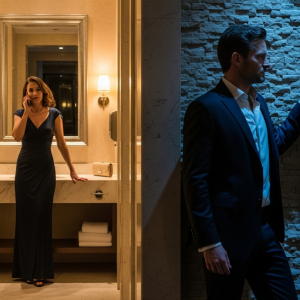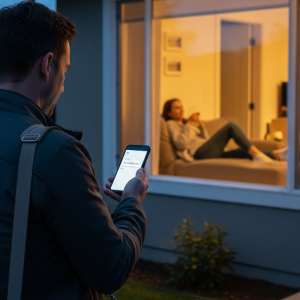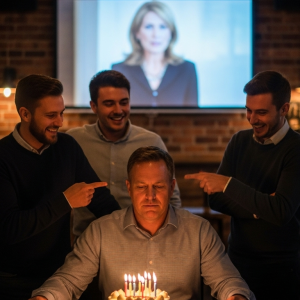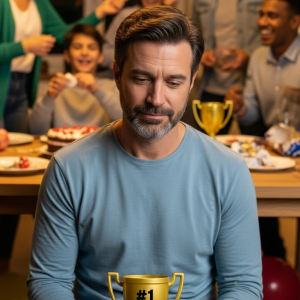The steady beeping of the heart monitor was the only sound in the sterile ICU room. Pneumonia had progressed into sepsis faster than anyone anticipated, and here I was, at twenty-six, fighting for my life. The doctors had been brutally honest: the first seventy-two hours were critical.
I called my family as soon as I was admitted. My mom, dad, and my sister, Isabella, lived only two hours away. I assumed they’d drop everything. Instead, I got a text from my mom.
Sorry, honey. We’re at the airport. The Hawaii trip is already paid for. We’ll see you when we’re back.
This was the first I’d heard of a Hawaii trip. As the days ticked by, my phone became a window into their vacation paradise. Isabella’s Instagram was a highlight reel of beaches and sunset dinners. My mom posted photos in a new swimsuit with the caption, “Living my best life at 52.” My dad posted golf course selfies. There was no mention of their daughter’s life-threatening illness.
My family had always treated me like a personal ATM. I was the responsible one—college on scholarships, two jobs, a six-figure income as a senior software engineer. Meanwhile, Isabella was a social media “influencer” with 847 followers, and my parents had retired early, relying on their savings and, increasingly, my generosity. For the past two years, I had paid their mortgage. I covered Isabella’s car payments. I gave my mom $15,000 for an “emergency” cosmetic procedure. I paid for holidays, gifts, even their groceries. And now, they were on a Hawaiian vacation I had unknowingly funded, telling me to stop being dramatic while I fought for my life, alone.
On day three, my fever finally broke. I could think clearly again. I sent a group text: Hey guys, I’m stable now, but still pretty sick. The doctors think I’ll be here for at least another week. Could someone please come? I’m pretty scared.
My mother responded an hour later. Stop being so dramatic, Clara. You’re fine if you’re texting. We’ll come when you pay for our tickets home and reimburse us for the vacation time we’d have to sacrifice.
I stared at the message, the words blurring, convinced the medication was making me hallucinate. Isabella’s response was worse.
LOL Mom is right. You’ve always been an attention seeker. Maybe dying will finally make you interesting for once. 🙂
I took a screenshot of both texts. In that moment, something inside me didn’t break; it shifted. A puzzle piece clicked into place, revealing a picture I’d refused to see before. The next three days in that hospital bed gave me plenty of time to think, and to plan.
From my hospital laptop, I began to systematically dismantle the financial safety net I had woven around my ungrateful family.
First, I logged into my bank account and canceled all automatic transfers. The mortgage payment, due on the 15th, was stopped. The credit card I had given them for “emergencies”—which they used for everything—was canceled and reported stolen.
Next, I called my investment advisor. “Luna, I need to make some changes. I want to remove my parents and sister as beneficiaries and emergency contacts on all of my accounts.”“Of course, honey,” she said gently. “Are you sure you want to do this while you’re still recovering?”“I’ve never been more sure of anything in my life.”
Then, I contacted my lawyer, Tom. “Tom, I need to revoke the power of attorney I gave my parents and change my will. Entirely.” After I explained why, there was a long pause on the other end of the line. “I’ll draft the new documents immediately,” he said finally. “And Clara… I’m sorry your family failed you.”
But I wasn’t finished. I had co-signed loans for them, put my name on utilities to boost their credit, and even acted as a co-borrower on their house. This gave me the authority to cancel everything. The family phone plan under my account: terminated. The car insurance I paid for all their vehicles: terminated, effective immediately.
The house was the final, devastating move. As a co-borrower on the mortgage, I had the right to demand immediate repayment of the debt. I contacted the bank, explained that I was recovering from a life-threatening illness and needed to protect my financial future, and requested to remove myself from the mortgage. If my parents couldn’t qualify for a new loan on their own or pay off the remainder, the house would go into foreclosure.
On day seven, I was released from the hospital. I had lost fifteen pounds and felt as weak as a kitten, but I was alive. I drove back to my quiet apartment, ordered soup, and waited.
The first call came at 6:47 p.m. It was my mother, her voice panicked. “Clara! There’s something wrong with our credit card! It was declined at dinner!”“That’s strange,” I replied calmly. “Maybe you should call the bank.”“We did! They said the account was closed! Did you close our credit card?”“I reported it stolen. When I was in the ICU and you were posting vacation photos, it seemed like someone else was using it.” The line went quiet. “Clara Elise Carter, you reopen that card right now! We’re stuck in Hawaii without money!”“I thought you paid for this vacation yourselves,” I said, then hung up.
Isabella called ten minutes later, screaming. “You psycho! You left us stranded!”“Maybe ask your new boyfriend to help,” I said. “The one from the couple’s massage video.”“You’ve been stalking our social media? You’re sick!”“I’ve been watching my family live it up while I nearly died. There’s a difference.” I hung up on her, too.
They made it home somehow, borrowing money and maxing out old credit cards. The real fun began when they arrived. The power was off. The gas was off. Three days later, the foreclosure notice arrived. That’s when the real begging began.
Isabella showed up at my apartment first, crying and apologizing. “Clara, I’m so sorry! I was drunk when I sent that text, I didn’t mean it!”“Which text?” I asked. “The one where you said maybe dying would make me interesting?” She just stammered and I told her to get off my property.
My parents tried everything. Guilt trips, false tears, threats. They even staged an ambush at my workplace, trying to corner me in the lobby. I simply told security they were harassing me and had them escorted out. The incident became something of an office legend.
Their most pathetic attempt came when Isabella posted a long Instagram story about how I was “mentally unstable” after my illness and that my behavior was a “cry for help.” The post backfired spectacularly when my friends flooded the comments, telling their own stories of visiting me in the hospital, bringing me food and comfort while my family posted vacation photos. She deleted the post within hours.
My mother then reported me to Adult Protective Services for elder abuse, claiming I had stolen their life savings. The social worker who contacted me was professional but skeptical. I invited her to my home and showed her every text, every bank statement, every social media post.
“Miss Carter,” she said, closing her notebook. “What you’re describing isn’t elder abuse. It’s setting a boundary. The complaint will be closed as unfounded.”
The failed report seemed to break something in my mom. Her calls became more erratic, filled with conspiracies about how I was trying to destroy their lives. That’s when I decided to get a restraining order. In court, they presented a well-manufactured story about a daughter who had a mental breakdown. Then I presented my evidence. The judge granted the order on the spot.
The silence that followed was beautiful. About three months after the Hawaii incident, I was offered a Vice President position at Technova Industries, a major client whose systems I had designed. The salary was nearly double what I was earning.
As I was discussing my new stock options, my family was being evicted from their motel room. As my career soared, their situation deteriorated. There was no satisfaction in it, just a quiet, emotional detachment. They were strangers now, living with the consequences of their own choices.
Life bloomed in the space their chaos used to occupy. I met someone—Tom, the lawyer who helped me with my will. He was kind, thoughtful, and respected my boundaries. When I told him my story, he said, “What you did took incredible strength. You chose yourself, and that’s not selfish. It’s healthy.”
A year after the Hawaii incident, I ran into my father at a grocery store. He looked older, worn down. “Clara,” he said softly. “You look good. Healthy.”“I am,” I replied. He paused. “I know we messed up. I don’t expect forgiveness, but I wanted you to know that I understand now what we lost.” It was the first sincere apology I had ever received from him. “Thank you for saying that,” I said. “But understanding what you lost doesn’t undo the damage you caused.”
Two years later, Tom and I married in a small ceremony, surrounded by friends who had become my chosen family. Isabella tried to crash the wedding, but security escorted her out before she could cause a scene. As she was being led away, she screamed, “She’s not even really sick! She’s just a dramatic attention seeker!” The irony was not lost on anyone.
The best kind of revenge isn’t about harming those who wronged you. It’s about building a life so fulfilling that their absence becomes a blessing. They thought losing me wouldn’t be a big deal. Instead, they lost the best thing that ever happened to them. And I got the life I always deserved. That is a trade I will make every time.
I used to think “family” was an unbreakable bond — a sort of invisible contract that no matter how badly things got, the people you were born to would show up. That belief died in that hospital room. It didn’t go quietly. It bled out slowly, in the time it took me to scroll through their smiling vacation posts while trying to keep my own oxygen levels stable.
But what I didn’t realize back then was that when something toxic leaves your life, it doesn’t just create emptiness — it creates space. And space is where new things grow.
The weeks after the Hawaii incident were both surreal and liberating. Every day, I woke up without the familiar anxiety of checking my phone for some “urgent” request from my mom or sister. No more texts demanding money for “emergencies” that always turned out to be frivolous wants. No more guilt trips when I hesitated. My mornings became my own again. I could drink my coffee without that knot in my stomach.
Of course, breaking away didn’t mean they stopped trying. The first few months were a carousel of pathetic strategies — from teary voicemails to outright hostility. My mom would leave these long, rambling messages about “how family should stick together” followed by a quick pivot into how “we need money for groceries” or “your father’s car needs repairs.” My sister tried the “just kidding” defense for her cruel hospital text at least four times, as if repeating it enough would erase the sting.
I didn’t block them immediately. I wanted the record — the proof. And the truth was, every manipulative call or petty insult only cemented my decision.
One afternoon, maybe three months after the ICU, Isabella showed up at my building again. She had on oversized sunglasses like she was hiding from paparazzi — the irony being, her “influencer” following had actually dropped since our falling-out. I stepped outside, made sure the security camera could see us, and folded my arms.
“I just want to talk,” she said.
“You had plenty of chances to talk when I was in the hospital,” I replied.
Her lips trembled — whether from real emotion or performance, I couldn’t tell. “You’re making a mistake. We’re family.”
“No,” I said evenly. “We’re related. That’s biology. Family is earned.”
She stormed off, muttering something about me being “heartless.” I watched her leave without a single ounce of guilt.
It was around then that I started therapy. I wasn’t naïve — I knew walking away from my family wasn’t just an action, it was a wound. And if I didn’t deal with it, it would fester. My therapist, Diane, was the first person to tell me, “Clara, you were financially and emotionally exploited for years. What you did wasn’t cruelty — it was survival.”
Those sessions became a turning point. I learned to recognize the signs of manipulation, the red flags I had ignored for decades. More importantly, I started to redefine “family” for myself. I realized my friends — the ones who came to see me in the ICU, who brought me soup, who sat by my bed — were more of a family than my blood relatives had ever been.
With the mental clutter gone, I threw myself into my work. The VP role at Technova was challenging, demanding, and exhilarating. For the first time, I could say “yes” to opportunities without worrying if my mom’s mortgage or my sister’s car payment would interfere. I traveled for conferences, took on big projects, and doubled my savings in under a year.
Tom and I started seeing more of each other outside of work. Our first official “date” was almost comical — we both showed up with color-coded planners because we’d been so busy. But beneath his quiet, lawyerly demeanor was a dry wit and a patience that felt… rare. He never pushed me to talk about my family, but when I did, he listened without judgment.
One night over dinner, I admitted something that had been gnawing at me.
“I’m afraid I’m too… damaged,” I said.
Tom set down his fork. “Clara, everyone has scars. The difference is, you know where yours are. That’s strength.”
It wasn’t some grand romantic declaration, but it hit me harder than any “I love you” could have in that moment.
About a year after the hospital, the restraining order was still in effect. My parents and sister had faded into the background noise of my life — occasional sightings through mutual acquaintances, vague rumors of financial trouble. I didn’t care enough to verify.
Then came the grocery store run-in with my dad. His apology — if you could call it that — was strange. It was the closest thing to accountability I’d ever heard from him, but it came years too late. He looked like a man who had aged two decades in two years. And for a brief, flickering second, I felt a pang of something… not forgiveness, but recognition. This was the man who taught me how to ride a bike, who used to tuck me in. But that man had also looked the other way while my mom and sister drained me dry.
Walking away from him that day felt final.
Tom proposed on a crisp autumn evening in the park where we’d had our first lunch together. There was no big crowd, no staged photographer — just him, a ring, and the quiet sincerity in his eyes. I said yes without hesitation.
We kept the wedding small — about thirty people, every single one of them someone who had shown up for me in real ways. Diane, my therapist, even got an invitation. She laughed and said, “I’ll cry during the vows, just warning you.”
When Isabella tried to crash the wedding, I almost felt bad for her. Almost. Watching her get escorted out while shouting insults was like watching a rerun of a bad show I’d already stopped caring about. My friends, my real family, barely reacted. She was irrelevant now.
The years since have been quiet — in the best way possible. Tom and I bought a house, not far from the office but with enough space for a garden. I started painting again, something I hadn’t touched since college. Saturday mornings are for coffee and reading together. Sundays, we hike.
Every so often, I’ll get a message from someone in my extended family, fishing for details about my life. I keep it polite but brief. I don’t owe anyone my story.
The last I heard, my parents were living in a small apartment in a neighboring state. Isabella bounced between boyfriends and short-term jobs. The foreclosure, the loss of my financial support — it all had a ripple effect they couldn’t escape. But here’s the thing: I don’t think about them much anymore. The part of me that once lived in reaction to their chaos has been replaced with something steadier.
When I do think about them, it’s with a strange sort of detachment. Not bitterness. Not longing. Just… neutrality. Like remembering a book I read years ago that no longer resonates.
The ICU taught me that mortality isn’t an abstract concept. You don’t always get warnings before the end. And in those moments, the people who matter most reveal themselves. My family revealed themselves on a beach in Hawaii while I lay in a hospital bed. That clarity was painful, but it was also a gift.
Because without it, I might still be their ATM. I might still be pouring my time, money, and emotional energy into a black hole, waiting for scraps of affection in return.
Instead, I have a life that’s full in ways I never thought possible. I have love that doesn’t come with strings attached. Friendships built on reciprocity. Work that challenges me. And a home that’s truly mine.
The best part? When I think about my future, there’s no shadow of obligation darkening the horizon. Just open space — and the freedom to fill it with people and things that actually deserve a place in my life.
If there’s one lesson I’d pass on from all of this, it’s that family isn’t about blood. It’s about who shows up when the chips are down, who stands beside you without calculating what they’ll get in return.
And sometimes, the bravest thing you can do is walk away from the people who share your DNA but not your values.
Because the truth is, surviving that ICU wasn’t just about beating sepsis. It was about waking up to a life I could actually live — and choosing to live it on my own terms.




